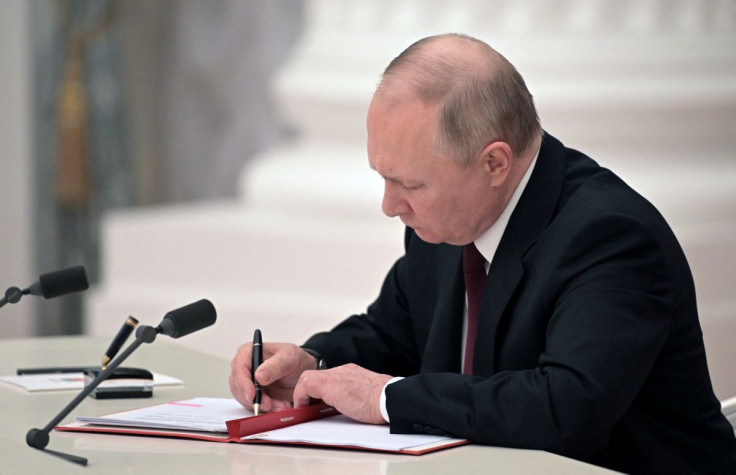Factbox-Ukraine Crisis - Where Will Putin Stop?

Now that Russian President Vladimir Putin has recognised the independence of separatist enclaves in eastern Ukraine and ordered in "peacekeeping" troops, the big question is: where will he stop?
Western countries have been warning for weeks that Moscow may be preparing for a possible all-out massed invasion to conquer its neighbour. Russia denies this, and Putin's moves so far have stopped well short of such a scenario.
But a televised address by Putin on Monday night - in which he characterised the Ukrainian state and its leaders as illegitimate - added to fears that he may aim to subjugate Ukraine by force.
Following are three possible scenarios:
1. SECURE THE EXISTING SEPARATIST ENCLAVES, THEN PAUSE THERE
While many commentators believe that sending troops into the separatist enclaves could be a first step towards a wider invasion, others note that it could also be a place to stop - or at least pause in terms of action on the ground - while trying to apply pressure to Ukraine in other ways.
"That gets him out of the 'backed into a corner, has to invade' scenario. He's done something. He can claim a victory for his domestic audience," said Tim Ripley, author of "Little Green Men: Putin's Wars Since 2014".
Ripley said he believes the most likely next steps - rather than immediately trying to take more territory - would be a "rolling campaign" to exert pressure on Ukraine in other ways, such as a naval blockade of Ukrainian ports on the Black Sea. The goal would be to intimidate Ukrainians by maintaining a constant crisis, while showing that Kyiv's Western allies were "a paper tiger", capable of offering little real help.
Meanwhile, Russia has already achieved some big objectives, such as forcing NATO allies to publicly acknowledge they will not send troops to defend Ukraine, and securing permission from neighbouring Belarus to station a large force there indefinitely.
"Belarus was quite a big move aimed at changing the balance in the region.... It transforms how NATO has to defend the Baltic states completely," Ripley said.
2. SEEK TO EXPAND THE SEPARATIST TERRITORY, WHILE LIMITING CONFLICT TO EASTERN UKRAINE
The separatists in eastern Ukraine control less than half of the two provinces they claim, and Ukrainian forces have opposed them across a heavily fortified frontline frozen by a much-violated ceasefire since 2015.
Without launching a massed invasion of Ukraine as a whole, Russia could try to expand separatist territory. Moscow has given mixed signals in the past 24 hours about whether its recognition of the separatist enclaves also amounts to accepting their claims to more territory in Ukraine.
One target could be Mariupol, eastern Ukraine's main port, which the separatists stopped short of attacking in 2014-2015. Capturing it would let Moscow link Russian-controlled Crimea over land to the separatist enclaves and secure complete control over the coast of the Sea of Azov, a strategic objective in itself and one that would also exert economic pressure on Kyiv.
But a war over incremental territory in eastern Ukraine, while likely to bring down tough international sanctions on Russia, would achieve only limited strategic gains. By itself, it would fall short of Moscow's perceived aim of installing a more compliant government in Kyiv.
"Capturing six villages outside Donetsk: it doesn't change the price of eggs at all," notes Ripley.
3. LARGE-SCALE INVASION
Western countries, especially the United States and Britain, have been warning for several weeks now of the likelihood of a much larger operation by Russia to capture all of Ukraine, or at least move on Kyiv to overthrow the government there.
Some commentators saw Putin's defiant televised speech on Monday night as evidence he will not be satisfied unless Ukraine is led by a government that acknowledges Russian hegemony.
"...It seems likely that Putin has much more in mind than simply taking a nibble out of Ukraine's east and taking formal responsibility for territories he already de facto controlled," wrote Shaun Walker, a journalist for Britain's Guardian newspaper and author of "The Long Hangover, Putin's New Russia and the Ghosts of the Past".
"Putin's final words, that if Kyiv did not stop the violence they would bear responsibility for the 'ensuing bloodshed', were ominous in the extreme. It sounded, quite simply, like a declaration of war."
© Copyright Thomson Reuters {{Year}}. All rights reserved.





















